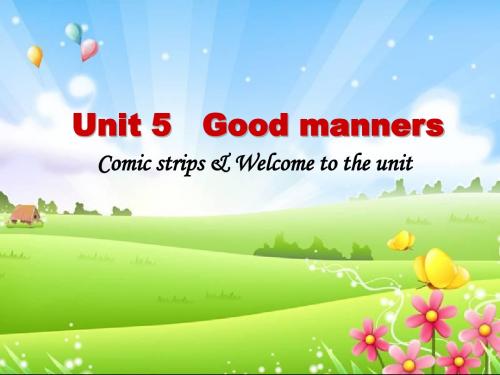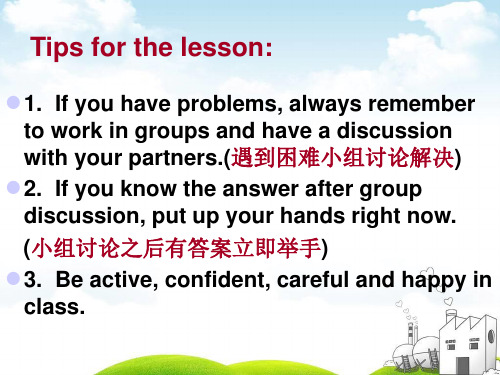牛津译林版八年级下册Unit 5 (Comic strip-Reading 2 )阶段检测试卷 (含
- 格式:doc
- 大小:26.50 KB
- 文档页数:4


八年级英语下Unit5第一课时课件教案(牛津译林版)Unit 5 Good manners Comic strip & Welcome to the unit欏垰I. Teaching aims and learning objectives By the end of the lesson, students should be able to: 1. know different kinds of knowledge about manners; 2. talk about how to act politely in public; II. Teaching contents 1. New words and phrases: manners, eh, politely, litter, tap, run, pick, obey, queue, turn, cut in (on sb./sth.), drop litter everywhere, leave the tap running, obey traffic rules, queue for your turn 2. New structures: We should/shouldn鈥檛鈥?We can/can鈥檛鈥?Don鈥檛/Always 鈥?You are old enough to learn about manners. You鈥檙e never too old to learn. III. Focus of the lesson and predicted area of difficulty To talk about how to act politely in public in English. IV. Teaching procedures Welcome to the unit Step 1 Lead-in Watch a video T: Watch a video about good manners.В涓€浜涘叧浜庤嫳鏂囩殑绀艰矊鐢ㄨ?Step 2 Presentation 1. Show some pictures about good manners and bad manners , to learn some new words and phrases. 銆愯?2. Look and learn T: I think you all know what to do in your daily life. It鈥檚time for me to check that. First, look at the pictures. Can we ...? I鈥檓afraid not. What should we do? We should always鈥?We shouldn鈥檛鈥?T: Look at the girl. Can she 鈥? Of course not. What should she do? She should 鈥?T: What鈥檚this? It鈥檚a tap. Is it good manners to鈥?after use? I鈥檓afraid not. What 鈥?then? Always 鈥?after use. Anything else? Try to 鈥?T: Look! What are they doing? They are following the traffic rules. Herefollow means obey. Can they 鈥? 鈥?What should they do then? 鈥?T: What about this picture? What are they doing? They are waiting for their turn. Here wait for means queue. What about this one? They are jumping the queue. Do we have to 鈥?in our school dining hall? Yes, it鈥檚polite to 鈥?鈥?impolite 鈥??Step 3 Practice . Look and match T: Please match the pictures with the phrases.傘€?Step 4 Listening & Speaking 1. Listen and complete T: Amy and her cousin Shirley are discussing what they should and should not do in the library. Listen to their dialogue and complete the form.?2. Discussion T: Work in pairs. Discuss what we should and should not do in a public place. Make a new dialogue. Here are some useful expressions for you.鑳藉姏銆傘€?Step 5 Teamwork T: Write down more right things and wrong things in the video as possible as you can?Comic strip Step 6Presentation 1. Watch a video T: Now let鈥檚watch a video. 2. Think and answer T: There are three questions for you. Please think and answer. (1) What does Eddie teach Hobo? (2) What does Eddie really want from Hobo? T: Can you understand the two sentences? 3. Read and act T: Now read the dialogue in pairs and act it out.ddie鍜孒obomanners in different countries.。



8B unit5<重点短语>1.drop litter everywhere 到处扔垃圾2.cut in(on sb./sth.)打断(谈话),插嘴3.queue for your turn排队等候你的顺序4.leave the tap running 让水龙头一直开着5.greet sb.with a kiss 和某人用亲吻打招呼6.shake sb.'s hand 与某人握手7.in public 公开地,在别人面前8.push in插队,加塞9.bump into someone撞到某人10.in one's way 挡住某人的路11.as well(as)也,还有12.by accident 偶然,意外地13.join the discussion 参加讨论14.keep sb.from sth.不让某人做某事,使免受。
15.risk losing everything 冒着失去一切的危险16.above all首要的是<重点句型>1.You're old enough to learn about manners now,Hobo.霍波,现在你足够大了,该学礼仪了。
2.You're never too old to learn.活到老,学到老。
3.British people only greet relatives or close friends with a kiss.英国人只和亲戚或亲密的朋友用亲吻打招呼。
4.They talk about the weather,holidays,music,books or something else.他们谈论天气、假期、音乐、书籍或其他一些事情。
5.They think it's rude to push in before others.他们认为在别人前面插队是粗鲁无礼的。

牛津译林版8上Unit 5 Wild animals 单元知识默写(Comic strip-Reading)Comic Strip & Welcome to the unit一、默写课文中的单词。
1.野生的adj.自然环境,野生状态,n.2.自由的,不受束缚的adj.3.一道菜;盘,碟,n.4.同情"n.5.死讥. 6.海豚n.7.大熊猫n.8.松鼠,n.9.斑马n.二、默写课文中的短语。
1.野生动物2,居住在野外’3由又快乐4.同情它们5,<口)不可能6.实际上,事实上7.最喜欢猴子8.如此聪明又滑稽9.动物世界之王10.看上去如此可爱11.我最喜欢的动物12.随时成为餐桌上的莱三、根据汉语提示完成下列句子。
1.野生动物喜欢居住在野外。
Wild animals____________________________________________.2.它们是强壮的而且它们能跑得很快。
They're____________ and they__________________________________________. 3.它们随时可能成为餐桌上的莱肴。
They may on the table_______________________________. 4.--因此请你不要吃它们好吗?——没门!--So eat them?--______________________________________________!5.我最喜欢熊猫。
它们看起来如此可爱。
I like . They__________________________________________. 6.--你最喜欢什么野生动物?--我最喜欢狮子。
-- wild animal__________________________________________?--I like___________________________________.7.没有它们我可能会死。
8下Unit 5 Good manners(Comic strip-Reading 2 )阶段检测卷一、英汉互译。
1.Behave po1itely in public 2.谈论英国的礼仪3.say hello to others 4.在公共场合压低声音5.shout or laugh loudly 6.和人打招呼合适的方法7.shake your hand 8.第—次见到你9.do as the Romans do 10.在街上撞到某人二、根据句子意思,用括号中所给汉语提示或首字母提示填空。
1. You had better not _________ (碰) the books on the desk. They are Mr Wang's.2. It's your ____________ (顺序) to answer the questions.3. Nancy should wait__________ (直到...... 为止) the party ends.4. Everyone should a __________ bumping into others when they are in the street.5. I saw him in the street by a______________.6. We Chinese often greet each other by s______________ hands.三、根据句子意思,用括号中所给单词的适当形式填空。
1. Try__________ (not be) late next time.2. What do we need to do___________ (improve) our manners?3. Try not to leave the girl_____________ (cry).4. Daniel met his close friend and_____________ (shake) hands with him excitedly in the street.5. The gentleman _____________ (behave) very politely just now.四、完形填空。
I'm enjoying my stay in Canada. It is my first experience of being abroad, and I am trying to learn as 1 as possible. Classes here are full of fun and very different from classes in 2 . In China there are very few chances to practice 3 and listening, so many Chinese students have good grammar, 4 their speaking is not good. Studying English at Fern is much more practical. We actually 5 the language we are learning. I couldn't speak any English at all when I 6 here. Thankfully after about a month, things started getting 7 and I made friends and started to settle in( 习惯). I am really 8 to learn English here and Fern is a very good language school.I have always wanted to have a sister. In my Canadian host family my dream has 9 . On the first day when I arrived, my host family welcomed 10 warmly. All the family members were 11 and helpful, and they made me feel at home at once.My 12 , Joise, is very kind. She often explains their manners to me. Her mother explains ordinary things like housework. Together they 13 me study and understand Canada. Joise told me a 14 Last year, she met a Chinese student on a plane. She said she felt sorry because she did not say 15 to the girl.I'm happy to live in Canada. I think it will be an important experience in my life.( )1. A. many B. much C. good D. soon ( )2. A. Japan B. Canada C. China D. America ( )3. A. playing B. reading C. writing D. speaking ( )4. A. but B. and C. or D. so( )5. A. write B. read C. hear D. use ( )6. A. entered B. arrived C. arrived in D. went ( )7. A. harder B. worse C. busier D. easier ( )8. A. sad B. sorry C. happy D. afraid ( )9. A. come true B. come out C. come over D. come on ( ) 10. A. him B. her C. me D. them ( ) 11. A. serious B. friendly C. rude D. impolite ( ) 12. A. sister B. father C. brother D. mother ( ) 13. A. see B. hear C. help D. watch ( ) 14. A. lie B. experience C. joke D. story ( ) 15. A. everything B. anything C. something D. nothing 五. 阅读理解。
For many years, no one could communicate with people who had been born without hearing. These deaf people were not able to use a spoken language.But, beginning in the 1700s, the deaf were taught a special language. Using this language, they could share thoughts and ideas with others. The language they used was a language without sound. It was a sign language.How did this sign language work? TEe deaf were taught to make certain movements using their hands, faces, and bodies. These movements stood for things and ideas. People might move their forefingers across their lips. This means, "You are not telling the truth." They might tap their chins with three fingers. This meant "my uncle".The deaf were also taught to use a finger alphabet(字母表).They used their fingers to make the letters of the alphabet. In this way, they spelled out words. Some deaf people could spell out words at a speed of 130 words per minute.Sign language and finger spelling are not used as much as they once were. Today, the deaf are taught to understand others by watching their lips(唇). They are also taught how to speak. ( ) 1. The deaf "talked" to other people________.A. by moving their hands, faces and bodiesB. by shouting and singingC. without using any lettersD. without using any language( )2. The deaf could spell out words_________.A. by reading them aloudB. by going here and thereC. by expressing the letters with their fingersD. by watching others( )3. Now, the deaf are trained(训练) to________.A. write sentences quicklyB. understand others by lip-readingC. be good at mind-readingD. keep alone happily( )4. From the passage we can infer that________.A. there is still no way to communicate with the deafB. the deaf must have special teachers to teach themC. in order to make a living, deaf people must make signsD. it is not very difficult for the deaf to learn sign language( )5. How did sign language help the deaf?A. It helped them learn to read.B. It helped them speak with their mouths.C. The deaf could understand sign language even if they had not learned it.D. It helped them to communicate with other people.复习(一)一, 1. 在公共场合表现礼貌 2. talk about good manners in the UK3.向别人问好4. keep your voice down in public5. 大声喊或笑6. the proper way to greet people7. 和你握手8. meet you for the first time 9. 像当地人那样做10. hump into sb in the street二,1. touch 2. turn 3. till 4. avoid 5. accident 6. shaking 三,1. not to be 2. to improve 3. crying 4. shook 5. behaved 四,1.B 2. C 3. D 4. A 5. D 6. B 7. D 8. C 9. A10. C ll.B 12. A 13. C 14. D 15. B五,1. A 2. C 3. B 4. B 5.D。